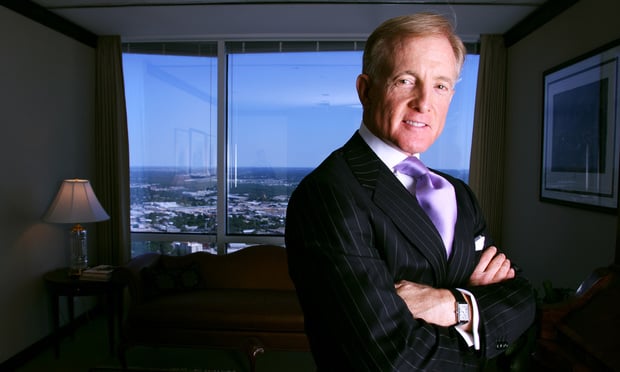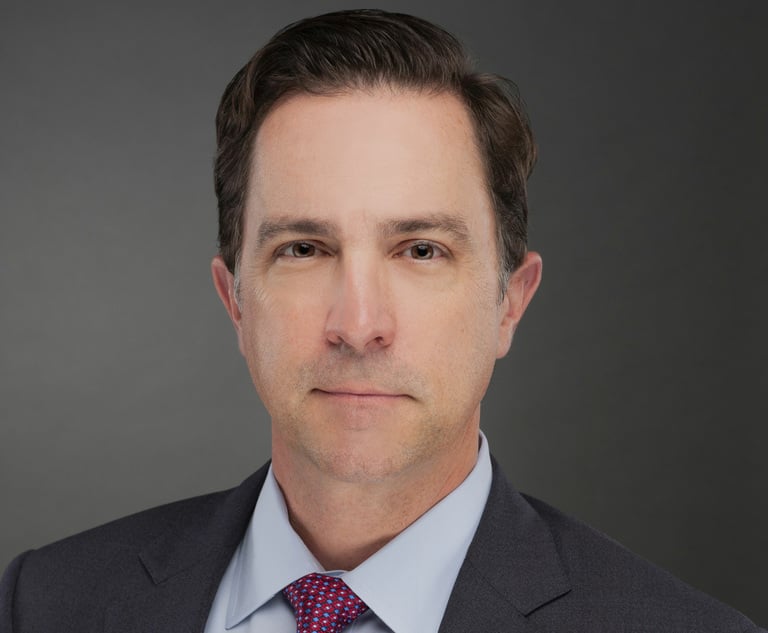All Eyes on Fort Worth for Controversial Appellate Case
The case, Brewer v. Lennox Hearth Products, involves issues that are sacrosanct for lawyers everywhere: The right to a fair, impartial jury trial, intertwined with the duty to zealously represent a client.
October 08, 2019 at 02:54 PM
4 minute read
 William "Bill" Brewer. Photo: Mark Graham
William "Bill" Brewer. Photo: Mark Graham
Law students in Fort Worth will have a front-row seat to one of the most-watched Texas appellate oral arguments of the year, which has drawn public interest around the nation and cohesive scorn from advocacy groups of attorneys on both sides of the bar.
The Texas Supreme Court travels across the Lone Star State from time to time for arguments, and on Thursday, justices will drop in at Texas A&M University School of Law in Fort Worth to hear two cases. It's quite special for law students, expected to pack a 240-room auditorium plus additional overflow classrooms, to sit in on one of those arguments.
It's as good an opportunity as you get to show law students how high-level concepts in the legal profession come into play in the real world, said A&M Law Dean Bobby Ahdieh.
"We want these cutting edge legal issues. We want the law school to be in the middle of that," he said.
The case, Brewer v. Lennox Hearth Products, involves issues that are sacrosanct for lawyers everywhere: the right to a fair, impartial jury trial, intertwined with the duty to zealously represent a client.
Here, Brewer Attorneys & Counselors partner William "Bill" Brewer III of Dallas and New York conducted a pretrial public opinion survey while representing a defendant. Although he maintains the survey was fair and balanced, his opponents characterize it as a "push poll" that tainted a potential jury pool.
Opponents unite against Brewer
Another closely watched aspect for argument observers: the national coverage. The case has garnered mentions in publications like The Washington Post, since Brewer himself has separately been embroiled in a high-profile leadership spat with the National Rifle Association.
Irrespective of Brewer's personal notoriety, the case is closely watched by the American Board of Trial Advocates, that group's Texas chapter, the Texas Association of Defense Counsel and the Texas Trial Lawyers Association. These groups often disagree about legislation and other legal issues. But in a rare move, they've united to oppose Brewer. As amicus parties, they'll get five minutes at the oral argument to explain why.
"The right to a fair and impartial jury means a lot more than just seating 12 people in a wooden box," said Brian Lauten of Dallas, who represents the legal associations. "It means there truly are 12 people who are disinterested, who can fairly and reasonably decide the disputed facts without any preconceived biases or misinformation about the case, before it starts. The conduct of Bill Brewer is a direct threat to that."
Big-picture questions
The dispute involves a trial court's $177,000 in sanctions against Brewer's firm, who represented a defendant in a multimillion-dollar products liability and wrongful death case related to steel tubing that exploded and caused a fire, according to the Seventh Court of Appeals opinion in the case. Brewer's firm hired vendors to do a telephone poll of 300 Lubbock homeowners about gas plumbing. Brewer maintained the poll was balanced, and not meant to influence public opinion. But his opponents claimed the telephone survey was meant to intimidate witnesses, contaminate the jury pool and delay the trial date.
Both sides claim the case raises big issues for the wider legal profession.
Brewer argues the case questions whether attorneys should fear sanctions for pretrial surveys, mock trials or jury focus groups which they use to zealously represent their clients. Brewer added that trial courts shouldn't have inherent authority to sanction a lawyer unless they have evidence of bad faith conduct, which wasn't present here.
On the other hand, the appellees argued that trial courts have inherent authority to sanction conduct that harms the judicial system and the right to a fair, impartial jury trial.
"If Texas doesn't police this kind of conduct, we are going to be the laughing stock of the nation. There are a lot of eyes across the country that are going to be focused on that Supreme Court argument."said appellees' attorney Ted B. Lyon, of Ted B. Lyon & Associates in Mesquite. "If an opinion is written that says this kind of conduct is acceptable, then it's not good for our justice system–either side."
Vinson & Elkins partner George Kryder III, who represents Brewer, didn't return a call seeking comment.
This content has been archived. It is available through our partners, LexisNexis® and Bloomberg Law.
To view this content, please continue to their sites.
Not a Lexis Subscriber?
Subscribe Now
Not a Bloomberg Law Subscriber?
Subscribe Now
NOT FOR REPRINT
© 2025 ALM Global, LLC, All Rights Reserved. Request academic re-use from www.copyright.com. All other uses, submit a request to [email protected]. For more information visit Asset & Logo Licensing.
You Might Like
View All
O'Melveny, White & Case, Skadden Beef Up in Texas With Energy, Real Estate Lateral Partner Hires
5 minute read
Chamberlain Hrdlicka Taps a New Leader as Firm Follows Succession Planning Path
3 minute read
Law Firms Are 'Struggling' With Partner Pay Segmentation, as Top Rainmakers Bring In More Revenue
5 minute read
Trending Stories
- 1'Reverse Robin Hood': Capital One Swarmed With Class Actions Alleging Theft of Influencer Commissions in January
- 2Hawaii wildfire victims spared from testifying after last-minute deal over $4B settlement
- 3How We Won It: Latham Secures Back-to-Back ITC Patent Wins for California Companies
- 4Meta agrees to pay $25 million to settle lawsuit from Trump after Jan. 6 suspension
- 5Stevens & Lee Hires Ex-Middle District of Pennsylvania U.S. Attorney as White-Collar Co-Chair
Who Got The Work
J. Brugh Lower of Gibbons has entered an appearance for industrial equipment supplier Devco Corporation in a pending trademark infringement lawsuit. The suit, accusing the defendant of selling knock-off Graco products, was filed Dec. 18 in New Jersey District Court by Rivkin Radler on behalf of Graco Inc. and Graco Minnesota. The case, assigned to U.S. District Judge Zahid N. Quraishi, is 3:24-cv-11294, Graco Inc. et al v. Devco Corporation.
Who Got The Work
Rebecca Maller-Stein and Kent A. Yalowitz of Arnold & Porter Kaye Scholer have entered their appearances for Hanaco Venture Capital and its executives, Lior Prosor and David Frankel, in a pending securities lawsuit. The action, filed on Dec. 24 in New York Southern District Court by Zell, Aron & Co. on behalf of Goldeneye Advisors, accuses the defendants of negligently and fraudulently managing the plaintiff's $1 million investment. The case, assigned to U.S. District Judge Vernon S. Broderick, is 1:24-cv-09918, Goldeneye Advisors, LLC v. Hanaco Venture Capital, Ltd. et al.
Who Got The Work
Attorneys from A&O Shearman has stepped in as defense counsel for Toronto-Dominion Bank and other defendants in a pending securities class action. The suit, filed Dec. 11 in New York Southern District Court by Bleichmar Fonti & Auld, accuses the defendants of concealing the bank's 'pervasive' deficiencies in regards to its compliance with the Bank Secrecy Act and the quality of its anti-money laundering controls. The case, assigned to U.S. District Judge Arun Subramanian, is 1:24-cv-09445, Gonzalez v. The Toronto-Dominion Bank et al.
Who Got The Work
Crown Castle International, a Pennsylvania company providing shared communications infrastructure, has turned to Luke D. Wolf of Gordon Rees Scully Mansukhani to fend off a pending breach-of-contract lawsuit. The court action, filed Nov. 25 in Michigan Eastern District Court by Hooper Hathaway PC on behalf of The Town Residences LLC, accuses Crown Castle of failing to transfer approximately $30,000 in utility payments from T-Mobile in breach of a roof-top lease and assignment agreement. The case, assigned to U.S. District Judge Susan K. Declercq, is 2:24-cv-13131, The Town Residences LLC v. T-Mobile US, Inc. et al.
Who Got The Work
Wilfred P. Coronato and Daniel M. Schwartz of McCarter & English have stepped in as defense counsel to Electrolux Home Products Inc. in a pending product liability lawsuit. The court action, filed Nov. 26 in New York Eastern District Court by Poulos Lopiccolo PC and Nagel Rice LLP on behalf of David Stern, alleges that the defendant's refrigerators’ drawers and shelving repeatedly break and fall apart within months after purchase. The case, assigned to U.S. District Judge Joan M. Azrack, is 2:24-cv-08204, Stern v. Electrolux Home Products, Inc.
Featured Firms
Law Offices of Gary Martin Hays & Associates, P.C.
(470) 294-1674
Law Offices of Mark E. Salomone
(857) 444-6468
Smith & Hassler
(713) 739-1250






